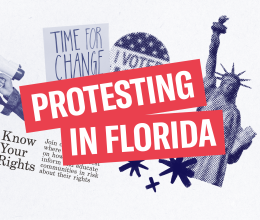
ACLU public records investigation finds counties all across the state have policies that attempt to safeguard against unconstitutional detention requests from ICE; Report published just before Florida House set to debate bill that would punish local law enforcement agencies that fail to follow each and every request by ICE to detain immigrants.
FOR IMMEDIATE RELEASE – January 26, 2016
TALLAHASSEE, FL – With the Florida House of Representatives set to debate a bill that would punish counties that choose to limit the circumstances under which they expend scarce resources to detain individuals at the request of federal immigration authorities, the American Civil Liberties Union (ACLU) of Florida today published a report showing that at least 30 Florida counties have policies that attempt to safeguard against unconstitutional detention requests from ICE.
The report, the result of a public records investigation by the ACLU of Florida initiated in December 2015, identifies county commissions, jails, and sheriff’s offices in 30 Florida counties that have policies declining to respond to ICE detainer requests, or to honor them only in limited circumstances, such as when they are accompanied by a judicial warrant.
An “ICE detainer” is a request from ICE that a local jail or other law enforcement agency detain an individual for an additional 48 hours after his or her ordinary release, in order to provide ICE agents time to decide whether to take the individual into federal custody for deportation proceedings. In counties where law enforcement agencies honor ICE holds, individuals are being imprisoned even when they have been cleared of all pending criminal charges against them. ICE detainers are merely requests, and local law enforcement agencies that enforce them absent a judicial determination of probable cause open themselves up to legal liability for choosing to detain someone in violation of the Fourth Amendment.
As the Florida Sheriff’s Association explained in a policy paper on the Priority Enforcement Program (PEP) that implements ICE detainers, even though “PEP asks sheriffs to accept unlimited liability in the enforcement of a Federal responsibility . . . [i]n cases where a sheriff’s office has been sued for honoring an ICE detainer, neither DHS nor any of its components have stepped forward with any type of support.”
“Local enforcement of ICE detainers is bad policy, and many Florida law enforcement agencies have shown they already know this,” stated ACLU of Florida staff attorney Shalini Goel Agarwal, the lead author of the report. “Not only does a county open itself up to legal liability for holding someone in a jail cell without a judicial warrant while a federal agency mulls whether or not it is going to take action, but it makes communities less safe when people in the community view police as being involved in the deportation business. Since trust and cooperation from the community is so important in protecting public safety, these localities have enacted policies to foster this trust and prioritize their resources on local public safety needs – not enforcing unfunded and unconstitutional federal requests.”
The publication of the report comes hours before the Florida House of Representatives is scheduled to debate HB 675, which would force local law enforcement agencies to honor ICE detainers under threat of serious financial and legal penalties. Under HB 675 and its Senate companion SB 872, local police agencies may be fined up to $5,000 for every day they do not fulfill every immigration request made of them and will be perpetually civilly liable for any future negligent acts committed by someone released by local enforcement if ICE put out a detainer request for them.
“Proponents of this legislation want to believe that choosing not to face the legal liability and costs that come with ICE detainers is something only done in liberal enclaves – it’s not,” stated ACLU of Florida Director of Public Policy Michelle Richardson. “Our report shows that law enforcement and elected leaders from every part of our state are making the smart decision to respect the Constitution, and to spare their taxpayers the legal liability of these unconstitutional holds. Members preparing to vote on HB 675 should look very closely at this list and consult with the sheriffs in their counties to find out what would happen back home before making a politically-based decision in Tallahassee.”
The 30 counties identified in the report are: Alachua County; Bradford County; Brevard County; Broward County; Charlotte County; Clay County; Flagler County; Gulf County; Hendry County; Hernando County; Highlands County; Hillsborough County; Indian River County; Lee County; Leon County; Levy County; Manatee County; Martin County; Miami-Dade County; Osceola County; Palm Beach County; Pasco County; Pinellas County; Polk County; Santa Rosa County; Sarasota County; Seminole County; St. Lucie County; Volusia County; and Washington County.
“If HB 675 becomes law, these counties will be damned if they do, damned if they don’t,” added Richardson. “Faced with the legal liabilities of unconstitutionally detaining someone on one hand, and the penalties piled on by this bill on the other, every police stop or jailhouse booking becomes a minefield for Florida police.”
A map showing the counties identified in the report is available here: https://www.aclufl.org/sites/default/files/map-of-florida-counties-with-...
The full report is available here: https://www.aclufl.org/sites/default/files/2016-01-26_aclufl_detainers_r...





